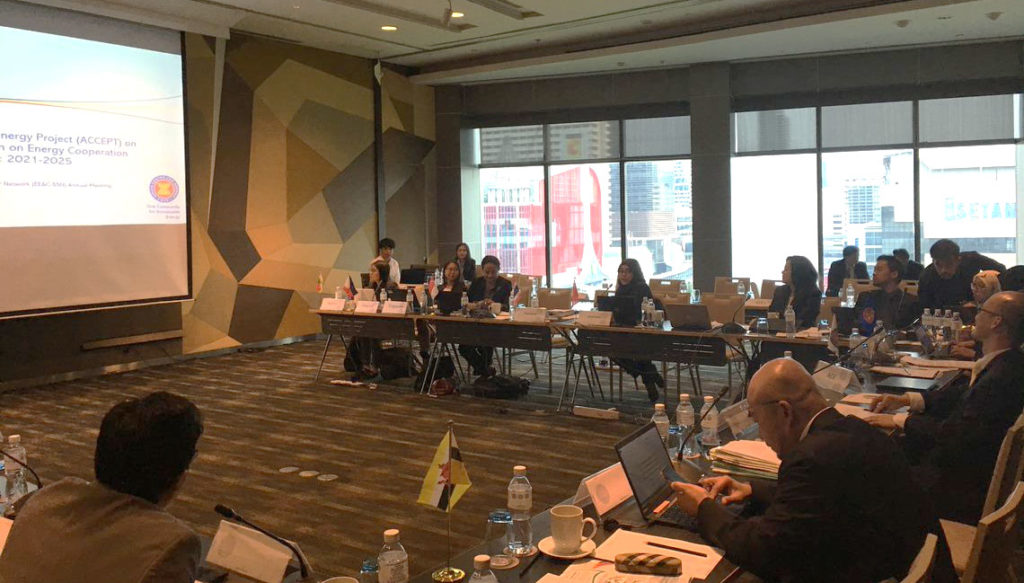[vc_row css=”.vc_custom_1565542682041{margin-right: 0px !important;margin-left: 0px !important;}”][vc_column css=”.vc_custom_1565542696462{padding-right: 0px !important;padding-left: 0px !important;}”][vc_single_image image=”3126″ img_size=”1600×400″ el_class=”banner-event”][/vc_column][/vc_row][vc_row css=”.vc_custom_1565542751414{margin-right: 0px !important;margin-left: 0px !important;}”][vc_column width=”1/4″][/vc_column][vc_column width=”1/2″ css=”.vc_custom_1565622195563{padding-bottom: 50px !important;}”][vc_column_text el_class=”title-event”][post_title][/vc_column_text][vc_column_text el_class=”date-venue-news”]Bangkok, 26 April 2019[/vc_column_text][vc_column_text el_class=”text-par-news”]Bangkok, Thailand – The 23rd Energy Efficiency and Conservation Sub-Sector Network (EE&C-SSN) meeting was held at Bangkok, Thailand, from 25 to 26 April 2019; and attended by the EE&C-SSN focal points. During the meeting, the EE&C-SSN focal points discussed a coherent approach and strategy to meet the energy intensity reduction target of 25% by 2025 and addressed issues related to energy efficiency and conservation with regard to the ASEAN Plan of Action on Energy Cooperation (APAEC) 2016-2025. Whereby the APAEC is an energy blueprint, in which the impacts of the outcomes are focused on four dimensions – energy security, affordability, accessibility, and sustainability.
ASEAN Climate Change and Energy Project (ACCEPT) is an international cooperation project between the ASEAN Centre for Energy (ACE) and the Norwegian Institute of International Affairs (NUPI), under the Norwegian-ASEAN Regional Integration Programme (NARIP).
One of the objectives of the project is to assess the impacts of the APAEC outcomes. Hence, the research team represented by Ms. Monika Merdekawati has taken this 23rd EE&C-SSN meeting as an opportunity to share a coherent approach through this project in developing Phase II of the APAEC.
The findings of the project will provide inputs and recommendations in improving the Phase I of the APEAC, in terms of Outcome-based Strategies (OBS) and Action Plans (AP) of the Programme Area 4, Energy Efficiency and Conservation (EE&C), and the synergy of climate-energy policy.
 The 23rd Energy Efficiency and Conservation Sub-Sector Network (EE&C-SSN) Meeting at Bangkok, Thailand
The 23rd Energy Efficiency and Conservation Sub-Sector Network (EE&C-SSN) Meeting at Bangkok, Thailand
The meeting had facilitated the information exchanges on energy efficiency policy and technology, the capacity building strategy, the development of energy efficiency standards and green building codes, and the evaluation of EE&C master plan progress and achievements.
The SSN also had reviewed and agreed on the addition of EE in the transport sector as the candidate of outcome-based strategy (OBS) under the EE&C program area for the draft of ASEAN Plan of Action for Energy Cooperation (APAEC) Phase II year 2020 – 2025.
During the 23rd EE&C-SSN meeting, EE&C-SSN focal points have shown their supports to the ACCEPT project. A study on technology to enhance energy efficiency has been recognized as one of the crucial aspects to be established as part of the regional strategies in shaping the climate-related energy policies; in particular, the energy efficiency technology in the transportation sector, which have yet to be explored in addressing the EE&C challenges. (MM)[/vc_column_text][vc_column_text el_class=”photo-caption-news”](Photo Credit: EE&C)[/vc_column_text][/vc_column][vc_column width=”1/4″][/vc_column][/vc_row]










